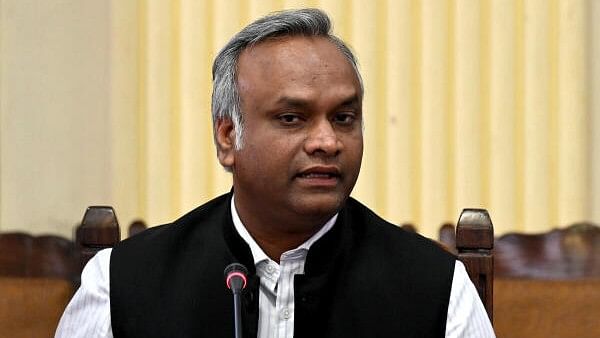
Minister for Rural Development and Panchayat Raj and Information Technology and Biotechnology, Priyank Kharge
Credit: DH Photo
Bengaluru: The Karnataka Government on Thursday launched a comprehensive cyber security policy 2024 to combat rising levels of cybercrimes and promote awareness, skill building, public-private partnerships and technology integration to protect the State's digital infrastructure.
The policy focuses on several key areas such as awareness and education, skill building, promotion of industry and startups, partnerships and collaborations for capacity building, officials said.
"The Government of Karnataka, recognising the rising importance of cyber security, has meticulously crafted this policy to establish a resilient and secure cyberspace for our citizens and enterprises," Minister for Rural Development and Panchayat Raj and Information Technology and Biotechnology, Priyank Kharge, said at the lunch event.
He emphasised that the policy, aligned with national and international efforts, highlights Karnataka's proactive stance in addressing cyber threats. According to him, the policy has two parts.
The first part focuses on building a strong cyber security ecosystem across all segments of the society, including public, academia, industry, start-ups and the government. The second part of the policy focuses on strengthening the cyber security posture of the State's IT assets.
Whilst the first part will be in public domain, the second will be internal to the state's IT teams and departments for their IT implementations. This policy has been collaboratively drafted by the Department of Electronics, IT, BT and S&T, the department of Personnel and Administrative Reforms (e-Governance), and the Home Department, in consultation with relevant stakeholders from both the government and private sectors.
The policy was also reviewed by the Indian Institute of Science, which is the anchor institute for the state's K-tech Centre of Excellence for Cyber Security (CySecK). He also launched a skilling programme by network giant CISCO.
"This partnership with CISCO is a testament to our commitment to fostering a secure digital environment. By training 40,000 individuals, with a special emphasis on empowering women, we are not only addressing the skills gap but also promoting inclusivity in the tech sector," Kharge said.